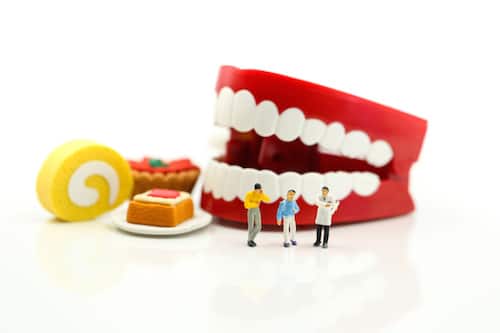
On February 14, 2020, the Centers for Disease Control (CDC) issued a report indicating that both type 1 and type 2 diabetes are on the rise for children. Children with type 1 diabetes increases at a rate of approximately 1.9 percent each year. The number is even higher for type 2, with a 4.8 percent increase annually. When considered together, type 1 and type 2 diabetes are the third-leading chronic disease in children.
Being the parent of a child with diabetes is challenging enough from a medical perspective. Unfortunately, many parents are unaware that diabetes also impacts their child’s oral health. Understanding how diabetes affects bones, gums, and teeth empowers parents to take proactive measures with their child’s oral health. This can help to avoid major complications later.
Blood Sugar and Oral Health in Children
All food that people eat converts into sugar that the body uses for energy. That process breaks down with the two types of diabetes in different ways. Let’s look at these two types.
Type 1 diabetes causes the body to not make enough insulin. Insulin is an essential hormone that transports sugar from the blood to the body’s cells to provide energy. With type 2 diabetes, the body does not respond to insulin properly. Both types of diabetes cause high blood sugar that can lead to a host of health problems, including oral health issues.
Oral Health Issues in Children with Untreated Diabetes
Untreated diabetes means that a child’s blood sugar is not within the normal range. Common oral health issues related to high blood sugar levels include:
- Decreased saliva production resulting in a dry mouth
- Increased risk of cavities due to less saliva in the mouth
- Increased risk of gum inflammation and bleeding known as gingivitis
- Tooth eruption may occur at a premature age
- Food may taste like it lacks flavor
- Increased risk of infections in the mouth like thrush
- Longer healing period after oral surgery and dental procedures, such as having a cavity filled
If you suspect your child has diabetes, the first step is to get an official diagnosis from a pediatrician. Once confirmed, monitor your child’s blood sugar levels daily and follow the pediatrician’s advice for keeping them balanced. You can also teach your child basic oral hygiene skills, such as brushing and flossing at least twice a day. Children under the age of six can be supervised during their dental hygiene routine.
At Smile First Pediatric Dentistry, we also encourage you to know the early signs of gum disease. These include bleeding gums, redness, and swelling, all of which can appear when brushing teeth or at random times. Be sure to report these symptoms to us so a treatment plan can be created to reverse the disease.
We also ask that you inform our staff that your child has diabetes when scheduling for the first time. Providing the contact information of your child’s pediatrician will also allow us to work together for your child’s health.
Please do not hesitate to contact Smile First Pediatric Dentistry at 631-563-7462 with questions. You can also click here to schedule an appointment.
